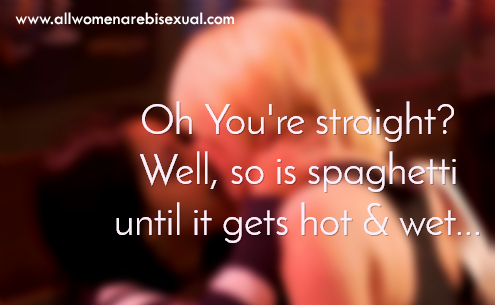Would We All Be Bisexuals One Day?
Ever think of the idea that one day either of you would be bisexuals or have you asked yourself about this idea? Society tends to divide straight and other genre’s. Here is an informative post that I thought would be cool to share!

Last week, I heard a girl on the radio, who was talking about how she would have no problem doing a threesome with another girl, if her boyfriend desired it. The girl’s carefree attitude, revealing to hundreds of thousands of strangers that she was open to a bisexual experience reminded me of a certain 2005 study from the CDC’s National Center for Health Statistics I had recently come across, which showed an increased percentage of girls who had had a homosexual experience compared to a similar study from 10 years earlier.
The implication would be that bisexuality might be losing the stigma that still pervades homosexuality and especially male homosexuality. If we look at popular media, there are clearly many more bisexual characters being portrayed in mainstream media today than a few decades ago. Groundbreaking films in that sense have included Basic Instinct, with its portrayal of a powerful bisexual female played by Sharon Stone, and Henry & June, which presented the complex relationships between writer Henry Miller, his wife and that icon of female sexual liberation — French writer Anais Nin. Popular TV series of the 21st century have also started commonly incorporating bisexual characters; with House as a prime example.
Considering that homosexuality was only removed from the American Psychiatric Association’s list of mental disorders in 1973, it is no wonder that the stigma of homosexuality, which naturally permeates bisexuality, is still deeply ingrained in Western culture.
The fact that legislation has started accepting homosexual relationships, enabling gay marriage and adoption by gay couples, also has an impact on our perceptions of bisexuality. In fact, if our perceptions hadn’t been slowly changing, those laws would never have been passed. Today, there is gay marriage in Argentina and the UK, in Sweden and parts of the US, and we are looking at a world that is ready to accept the possibility of healthy, functional families comprising two same sex partners.
Gay men, gay women: not the same?
It would seem that it is much easier for people in general to accept the idea of female homosexuality than that of male homosexuality. As erotic content across the media fosters the idea that lesbianism is “hot,” the transgression perceived in female homosexuality seems to be much smaller than the assumptions regarding gay males. The flip side would be that a large percentage of women engage in bisexual practices, just to satisfy their male partners, like the girl on the radio; however, without this necessarily implying an acceptance of bisexuality or homosexuality.
It would follow, hence, that bisexual women would face much less stigmatization than bisexual men. These double standards have been measured and assessed many times. For example, a psychological study measuring arousal patterns found that the vast majority of a group of men who claimed to be bisexual were in fact only attracted by men. The self-confessed bisexuals were shown erotic films and photographs portraying both men and women, and measurements showed that almost all of them were in fact only aroused by the erotic images of men. The conclusion would be that the stigmatization of male homoeroticism fosters a type of male bisexuality that is in fact “closeted” homosexuality.
Lisa Diamond, Associate Professor of Psychology and Gender Identity at the University of Utah, who has carried on her own very influential research, praised the study mentioned above, stating that:
Research on sexual orientation has been based almost entirely on self-reports, and this is one of the few good studies using physiological measures.
In fact, Diamond was right on target, as this is one of the main problems with this type of studies. Namely, that both the social stigma and the self-identity conflicts associated with bisexuality and homosexuality sometimes contribute to make statistical data unreliable.
The search for an identity
Woody Allen is credited with having defined bisexuality very lightly by saying that it “doubles your chance of a date on Saturday night.” It is not all that easy for bisexual individuals, it would seem. A bisexual identity is hard to come by, as it seems to be located in a grey area that is even harder for non-bisexuals to understand than homosexuality. According to Linda Alcoff,
Struggles of social identity have been fought against the subtle social contracts by which whole identity groups are denied equality and basic human rights.
As an anonymous bisexual student from the University of Minnesota put it in one of his blogs,
It is a difficult issue. For many, a bisexual is either ‘not gay enough’ within the gay community, or ‘just gay enough’ to be excluded from the straight community.
The problems of establishing and defining a bisexual identity were also addressed by Amy André, in her commentary of a study by Dr. Diamond:
Bisexuality, defined as experiencing attraction to other adults, regardless of gender, has often been described by mono-sexual people (i.e., heterosexuals, gays and lesbians) as mysterious and difficult to understand. This is because mono-sexual people take gender into account when assessing attraction; therefore, it can be challenging to imagine that there is a whole world of people out there who don’t do the same.
Bisexual individuals face a twofold identity problem: as they struggle to define themselves in terms of their sexual orientation and/or sexual desires/actions, they must also deal with the fact that most people do not understand the concept of bisexuality, and with assumptions such as the famous saying “you are either gay, straight, or lying,” which do not leave room for the construction of a true bisexual identity. Continue reading…
Here’s a video of lesbian girls fingering and kissing…














0 Comments
You can be the first one to leave a comment.